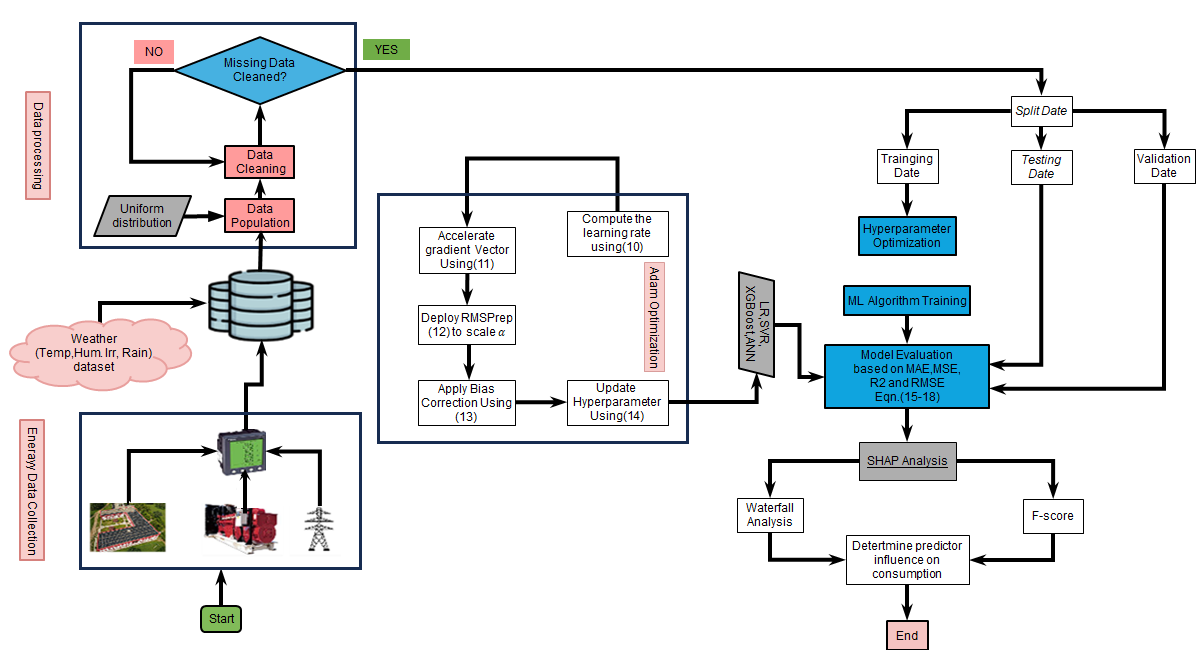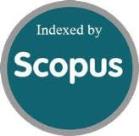Energy Demand Forecasting for Hybrid Microgrid Systems Using Machine Learning Models
DOI:
https://doi.org/10.46604/peti.2024.14098Keywords:
energy demand, forecasting, hybrid microgrid, machine learningAbstract
This study aims to design energy demand forecasting models for energy management in hybrid microgrid systems using optimized machine learning techniques. By incorporating temperature, humidity, season, hour of the day, and irradiance, the complex relationship between these input parameters and the yield of photovoltaics, generator, and grid energy sources is examined. Five different machine learning models including linear regression, random forest (RF), support vector regression, artificial neural network, and extreme gradient boosting models are adopted in this study. Evaluation of model performance shows that the RF model is the best candidate for the dataset, with a mean-squared error of 0.2023, mean absolute error of 0.0831, root-mean-squared error of 0.4498, and R² score of 0.9992. Shapley additive explanations analysis identified key predictors such as hour, irradiation, and season while highlighting the negative impact of humidity and day of the week on energy demand.
References
E. Dogan, M. Z. Chishti, N. K. Alavijeh, and P. Tzeremes, “The Roles of Technology and Kyoto Protocol in Energy Transition Towards COP26 Targets: Evidence from the Novel GMM-PVAR Approach for G-7 Countries,” Technological Forecasting and Social Change, vol. 181, article no. 121756, 2022.
C. Ammari, D. Belatrache, B. Touhami, and S. Makhloufi, “Sizing, Optimization, Control and Energy Management of Hybrid Renewable Energy System-A Review,” Energy and Built Environment, vol. 3, no. 4, pp. 399-411, 2022.
M. Khalid, “Smart Grids and Renewable Energy Systems: Perspectives and Grid Integration Challenges,” Energy Strategy Reviews, vol. 51, article no. 101299, 2024.
M. Issa, M. Rezkallah, A. Ilinca, and H. Ibrahim, “4 - Grid Integrated Non-Renewable Based Hybrid Systems: Control Strategies, Optimization, and Modeling,” Hybrid Technologies for Power Generation, pp. 101-135, 2022.
A. Ali, R. Jayaraman, A. Mayyas, B. Alaifan, and E. Azar, “Machine Learning as a Surrogate to Building Performance Simulation: Predicting Energy Consumption under Different Operational Settings,” Energy And Buildings, vol. 286, article no. 112940, 2023.
H. Wang, “Research on the Application of Random Forest-Based Feature Selection Algorithm in Data Mining Experiments,” International Journal of Advanced Computer Science and Applications, vol. 14, no. 10, pp. 505-518, 2023.
H. Lee, D. Kim, and J. H. Gu, “Prediction of Food Factory Energy Consumption Using MLP and SVR Algorithms,” Energies, vol. 16, no. 3, article no. 1550, 2023.
D. K. Dhaked, P. Kumar, and S. Ganguly, “Development of Data-Driven Model for Proton Exchange Membrane Fuel Cell Using Machine Learning Approaches,” Proceedings of IEEE 3rd International Conference on Control, Instrumentation, Energy & Communication, pp. 67-72, 2024.
I. H. Kartowisastro and J. Latupapua, “A Comparison of Adaptive Moment Estimation (Adam) and RMSProp Optimisation Techniques for Wildlife Animal Classification Using Convolutional Neural Networks,” Revue d'intelligence Artificielle, vol. 37, no. 4, pp. 1022-1023, 2023.
M. Reyad, A. M. Sarhan, and M. Arafa, “A Modified Adam Algorithm for Deep Neural Network Optimization,” Neural Computing and Applications, vol. 35, pp. 17095-17112, 2023.
S. Y. Shin and H. G. Woo, “Energy Consumption Forecasting in Korea using Machine Learning Algorithms,” Energies, vol. 15, no. 13, article no. 4880, 2022.
D. K. Dhaked, S. Dadhich, and D. Birla, “Power Output Forecasting of Solar Photovoltaic Plant using LSTM,” Green Energy and Intelligent Transportation, vol. 2, no. 5, article no. 100113, 2023.
Y. Gebreyesus, D. Dalton, S. Nixon, D. De Chiara, and M. Chinnici, “Machine Learning for Data Center Optimizations: Feature Selection using Shapley Additive Explanation (SHAP),” Future Internet, vol. 15, no. 3, article no. 88, 2023.
V. L. Narayanan, D. K. Dhaked, and R. Sitharthan, “Improved Machine Learning-Based Pitch Controller for Rated Power Generation in Large-Scale Wind Turbine,” Renewable Energy Focus, vol. 50, article no. 100603, 2024.
A. Khan and M. Sudheer, “Machine Learning-Based Monitoring and Modeling for Spatio-Temporal Urban Growth of Islamabad,” The Egyptian Journal of Remote Sensing And Space Science, vol. 25, no. 2, pp. 541-550, 2022.
R. Wazirali, E. Yaghoubi, M. S. S. Abujazar, R. Ahmad, and A. H. Vakili, “State-of-the-Art Review on Energy and Load Forecasting in Microgrids using Artificial Neural Networks, Machine Learning, and Deep Learning Techniques,” Electric Power Systems Research, vol. 225, article no. 109792, 2023.
S. N. V. B. Rao, V. P. K. Yellapragada, K. Padma, D. J. Pradeep, C. P. Reddy, et al., “Day-Ahead Load Demand Forecasting in Urban Community Cluster Microgrids using Machine Learning Methods,” Energies, vol. 15, no. 17, article no. 6124, 2022.
R. M. A. El-Aziz, “Renewable Power Source Energy Consumption by Hybrid Machine Learning Model,” Alexandria Engineering Journal, vol. 61, no. 12, pp. 9447-9455, 2022.
D. Mhlanga, “Artificial Intelligence and Machine Learning for Energy Consumption and Production in Emerging Markets: A Review,” Energies, vol. 16, no. 2, article no. 745, 2023.
A. R. Singh, R. S. Kumar, M. Bajaj, C. B. Khadse, and L. Zaitsev, “Machine Learning-Based Energy Management and Power Forecasting in Grid-Connected Microgrids with Multiple Distributed Energy Sources,” Scientific Report vol. 14,article no. 19207, 2024.
T. A. Zarma, P. O. Micheal, A. A. Galadima, T. Karataev, A. Adeleke, O. Oghorada, et al., “Development of Energy Demand and Carbon Emission Dataset for Nile University of Nigeria,” Data In Brief, vol. 49, article no. 109347, 2023.
L. Quaranta, F. Calefato, and F. Lanubile, “KGTorrent: A Dataset of Python Jupyter Notebooks from Kaggle,” Proceedings of IEEE/ACM 18th International Conference on Mining Software Repositories, pp. 550-554, 2021.
S. Arefin, M. Chowdhury, R. Parvez, T. Ahmed, A. F. M. S. Abrar, and F. Sumaiya, “Understanding Apt Detection Using Machine Learning Algorithms: Is Superior Accuracy a Thing?,” Proceedings of IEEE International Conference on Electro Information Technology, pp. 532-537, 2024.
V. E. Sathishkumar, C. Shin, and Y. Cho, “Efficient Energy Consumption Prediction Model for a Data Analytic-Enabled Industry Building in a Smart City,” Building Research & Information, vol. 49, no. 1, pp. 127-143, 2021.
Y. Nohara, K. Matsumoto, H. Soejima, and N. Nakashima, “Explanation of Machine Learning Models Using Shapley Additive Explanation and Application for Real Data in Hospital,” Computer Methods and Programs in Biomedicine, vol. 214, article no. 106584, 2022.
K. Pradeep and T. Likhita, “Machine-Learning Based Approach to Predict Energy Consumption of India States,” Proceedings of 6th International Conference on Computing Methodologies and Communication, pp. 1153-1156, 2022.
N. Shirzadi, A. Nizami, M. Khazen, and M. Nik-Bakht, “Medium-Term Regional Electricity Load Forecasting Through Machine Learning and Deep Learning,” Designs, vol. 5, no. 2, article no. 27, 2021.

Published
How to Cite
Issue
Section
License
Copyright (c) 2025 Tahir Aja Zarma, Emmanuel Ali, Ahmadu Adamu Galadima, Tologon Karataev, Suleiman Usman Hussein, Adekunle Akanni Adeleke

This work is licensed under a Creative Commons Attribution-NonCommercial 4.0 International License.
Submission of a manuscript implies: that the work described has not been published before that it is not under consideration for publication elsewhere; that if and when the manuscript is accepted for publication. Authors can retain copyright of their article with no restrictions. Also, author can post the final, peer-reviewed manuscript version (postprint) to any repository or website.

Since Oct. 01, 2015, PETI will publish new articles with Creative Commons Attribution Non-Commercial License, under The Creative Commons Attribution Non-Commercial 4.0 International (CC BY-NC 4.0) License.
The Creative Commons Attribution Non-Commercial (CC-BY-NC) License permits use, distribution and reproduction in any medium, provided the original work is properly cited and is not used for commercial purposes







